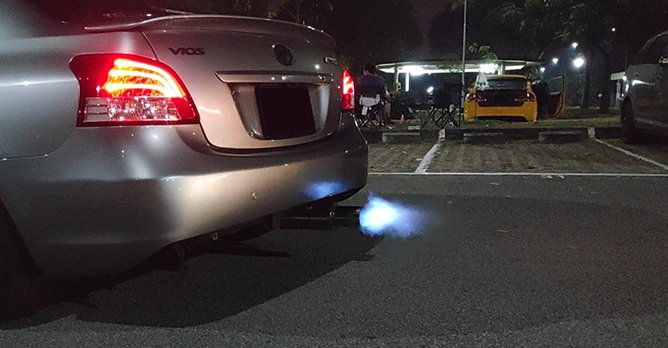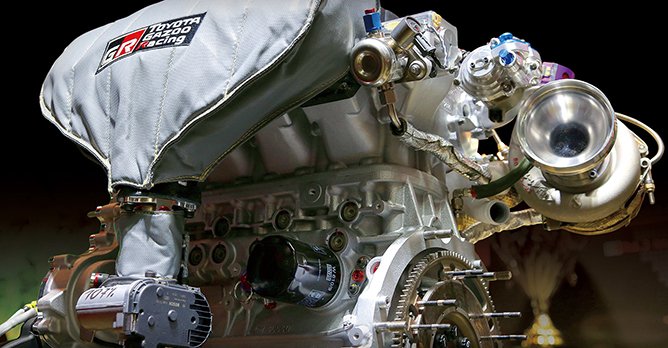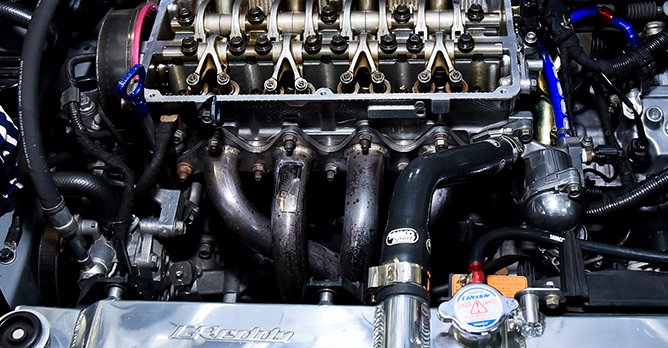What they don't tell you: Your pop and bang map isn't anti-lag and it isn't doing anything for your car's performance
06 Jan 2023|34,169 views
Modern day technology has made fettling with cars much easier and more accessible than before. With an Engine Control Unit (ECU) taking care of things such as the air-fuel ratio and the ignition timing, there's no need to meddle with things such as the jetting of a carburettor or adjusting the distributor - everything can be adjusted to the finest detail with the use of a computer and the appropriate software and/or hardware.
It didn't take long for people to realise that one could meddle with the ECU settings to get a car to produce loud pop and bang noises, and even flames from the exhaust with relative ease. While many have likened it to the anti-lag system found on Rally cars, is it really the same thing?
What is 'pop and bang' and how is it achieved

The loud noises and flames occur when fuel enters the hot exhaust system and ignites. Normally, such a phenomenon will almost never happen as the manufacturers will design the fuel system to stop injecting fuel when you get off the throttle.
One way to get the car to pop and bang would be to retard the ignition timing during deceleration by tweaking the ECU. By doing so, the ignition event is delayed so much that the air and fuel mixture never gets ignited within the cylinder. Instead, it eventually combusts within the exhaust manifold, producing the loud noise.
Another method would be to meddle with the fuel overrun settings within the ECU, which effectively means that the injectors are still dumping fuel into the engine during deceleration. Likewise, the excess fuel will enter the exhaust system and combust within. With this method, you can even achieve large flames from the exhaust due to the sheer amount of fuel that gets dumped into the exhaust system.
"My tuner told me it is a form of anti-lag"

The anti-lag systems found in WRC rally cars and other purpose-built race cars are specially engineered with dedicated systems that introduce fresh air directly into the exhaust manifold.
This results in a powerful combustion event (in the exhaust manifold), which will quickly spool the turbo up and reduce turbo lag before the driver gets back on the throttle, or in between gears. And if you think it sounds harmful to the engine, it actually is. A true anti-lag system puts plenty of stress on components such as the engine, the turbo and the exhaust manifold.
Meanwhile, the typical pop and bang ECU tune simply isn't substantial enough to work as an anti-lag setup. Furthermore, there are plenty of naturally aspirated car owners who have been fooled into pop and bang tunes, which definitely don't do anything to the performance at all.
But there's no harm done right?

Aside from the potentially costly damage that you can do to your car, the larger issue is the nuisance that you'll create. The issue is aggravated especially if you do not have the self-restraint to act in a civilised manner while driving past housing areas during wee hours. Furthermore, the widely shared opinion, even among car enthusiasts, is that pop and bang noises simply don't sound good.
So, do your car and everyone else a favour, stop wasting your money on pop and bang tunes to make a fool out of yourself.
Here are some other articles that you might be interested in:
What they don't tell you: A loud exhaust doesn't always make more power
What they don't tell you: An extreme-performance tyre might not be the best choice for everyone
What they don't tell you: Lowering your car with coilovers isn't going to magically perfect its handling
What they don't tell you: The downsides of installing a big brake kit
Mythbusted: Does a faster car always consume more fuel?

Sgcarmart
Join the Sgcarmart Community
Become a Community member to enjoy exclusive promos & freebies for you and your car!
- Be the first to enjoy exclusive promos & giveaways
- Enjoy membership perks for Sgcarmart services
Modern day technology has made fettling with cars much easier and more accessible than before. With an Engine Control Unit (ECU) taking care of things such as the air-fuel ratio and the ignition timing, there's no need to meddle with things such as the jetting of a carburettor or adjusting the distributor - everything can be adjusted to the finest detail with the use of a computer and the appropriate software and/or hardware.
It didn't take long for people to realise that one could meddle with the ECU settings to get a car to produce loud pop and bang noises, and even flames from the exhaust with relative ease. While many have likened it to the anti-lag system found on Rally cars, is it really the same thing?
What is 'pop and bang' and how is it achieved

The loud noises and flames occur when fuel enters the hot exhaust system and ignites. Normally, such a phenomenon will almost never happen as the manufacturers will design the fuel system to stop injecting fuel when you get off the throttle.
One way to get the car to pop and bang would be to retard the ignition timing during deceleration by tweaking the ECU. By doing so, the ignition event is delayed so much that the air and fuel mixture never gets ignited within the cylinder. Instead, it eventually combusts within the exhaust manifold, producing the loud noise.
Another method would be to meddle with the fuel overrun settings within the ECU, which effectively means that the injectors are still dumping fuel into the engine during deceleration. Likewise, the excess fuel will enter the exhaust system and combust within. With this method, you can even achieve large flames from the exhaust due to the sheer amount of fuel that gets dumped into the exhaust system.
"My tuner told me it is a form of anti-lag"

The anti-lag systems found in WRC rally cars and other purpose-built race cars are specially engineered with dedicated systems that introduce fresh air directly into the exhaust manifold.
This results in a powerful combustion event (in the exhaust manifold), which will quickly spool the turbo up and reduce turbo lag before the driver gets back on the throttle, or in between gears. And if you think it sounds harmful to the engine, it actually is. A true anti-lag system puts plenty of stress on components such as the engine, the turbo and the exhaust manifold.
Meanwhile, the typical pop and bang ECU tune simply isn't substantial enough to work as an anti-lag setup. Furthermore, there are plenty of naturally aspirated car owners who have been fooled into pop and bang tunes, which definitely don't do anything to the performance at all.
But there's no harm done right?

Aside from the potentially costly damage that you can do to your car, the larger issue is the nuisance that you'll create. The issue is aggravated especially if you do not have the self-restraint to act in a civilised manner while driving past housing areas during wee hours. Furthermore, the widely shared opinion, even among car enthusiasts, is that pop and bang noises simply don't sound good.
So, do your car and everyone else a favour, stop wasting your money on pop and bang tunes to make a fool out of yourself.
Here are some other articles that you might be interested in:
What they don't tell you: A loud exhaust doesn't always make more power
What they don't tell you: An extreme-performance tyre might not be the best choice for everyone
What they don't tell you: Lowering your car with coilovers isn't going to magically perfect its handling
What they don't tell you: The downsides of installing a big brake kit
Mythbusted: Does a faster car always consume more fuel?

Sgcarmart
Join the Sgcarmart Community
Become a Community member to enjoy exclusive promos & freebies for you and your car!
- Be the first to enjoy exclusive promos & giveaways
- Enjoy membership perks for Sgcarmart services


















